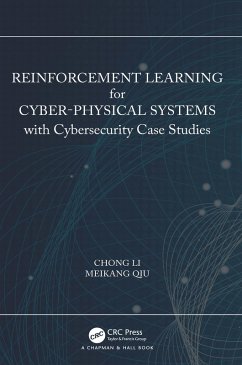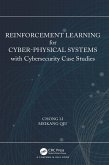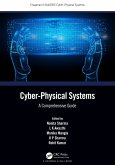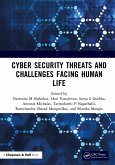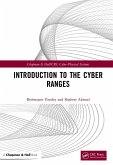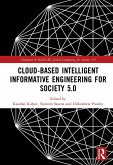Chong Li, Meikang Qiu
Reinforcement Learning for Cyber-Physical Systems (eBook, ePUB)
with Cybersecurity Case Studies
46,95 €
46,95 €
inkl. MwSt.
Sofort per Download lieferbar

23 °P sammeln
46,95 €
Als Download kaufen

46,95 €
inkl. MwSt.
Sofort per Download lieferbar

23 °P sammeln
Jetzt verschenken
Alle Infos zum eBook verschenken
46,95 €
inkl. MwSt.
Sofort per Download lieferbar
Alle Infos zum eBook verschenken

23 °P sammeln
Chong Li, Meikang Qiu
Reinforcement Learning for Cyber-Physical Systems (eBook, ePUB)
with Cybersecurity Case Studies
- Format: ePub
- Merkliste
- Auf die Merkliste
- Bewerten Bewerten
- Teilen
- Produkt teilen
- Produkterinnerung
- Produkterinnerung

Bitte loggen Sie sich zunächst in Ihr Kundenkonto ein oder registrieren Sie sich bei
bücher.de, um das eBook-Abo tolino select nutzen zu können.
Hier können Sie sich einloggen
Hier können Sie sich einloggen
Sie sind bereits eingeloggt. Klicken Sie auf 2. tolino select Abo, um fortzufahren.

Bitte loggen Sie sich zunächst in Ihr Kundenkonto ein oder registrieren Sie sich bei bücher.de, um das eBook-Abo tolino select nutzen zu können.
This book introduces reinforcement learning, and provides novel ideas and use cases to demonstrate the benefits of using reinforcement learning for Cyber Physical Systems. Two important case studies on applying reinforcement learning to cybersecurity problems are included.
- Geräte: eReader
- mit Kopierschutz
- eBook Hilfe
- Größe: 6.9MB
Andere Kunden interessierten sich auch für
![Reinforcement Learning for Cyber-Physical Systems (eBook, PDF) Reinforcement Learning for Cyber-Physical Systems (eBook, PDF)]() Chong LiReinforcement Learning for Cyber-Physical Systems (eBook, PDF)46,95 €
Chong LiReinforcement Learning for Cyber-Physical Systems (eBook, PDF)46,95 €![Cyber-Physical Systems (eBook, ePUB) Cyber-Physical Systems (eBook, ePUB)]() Cyber-Physical Systems (eBook, ePUB)53,95 €
Cyber-Physical Systems (eBook, ePUB)53,95 €![Advanced Techniques and Applications of Cybersecurity and Forensics (eBook, ePUB) Advanced Techniques and Applications of Cybersecurity and Forensics (eBook, ePUB)]() Advanced Techniques and Applications of Cybersecurity and Forensics (eBook, ePUB)54,95 €
Advanced Techniques and Applications of Cybersecurity and Forensics (eBook, ePUB)54,95 €![Phishing Detection Using Content-Based Image Classification (eBook, ePUB) Phishing Detection Using Content-Based Image Classification (eBook, ePUB)]() Shekhar KhandelwalPhishing Detection Using Content-Based Image Classification (eBook, ePUB)19,95 €
Shekhar KhandelwalPhishing Detection Using Content-Based Image Classification (eBook, ePUB)19,95 €![Cyber Security Threats and Challenges Facing Human Life (eBook, ePUB) Cyber Security Threats and Challenges Facing Human Life (eBook, ePUB)]() Cyber Security Threats and Challenges Facing Human Life (eBook, ePUB)46,95 €
Cyber Security Threats and Challenges Facing Human Life (eBook, ePUB)46,95 €![Introduction to the Cyber Ranges (eBook, ePUB) Introduction to the Cyber Ranges (eBook, ePUB)]() Bishwajeet PandeyIntroduction to the Cyber Ranges (eBook, ePUB)45,95 €
Bishwajeet PandeyIntroduction to the Cyber Ranges (eBook, ePUB)45,95 €![Cloud-based Intelligent Informative Engineering for Society 5.0 (eBook, ePUB) Cloud-based Intelligent Informative Engineering for Society 5.0 (eBook, ePUB)]() Cloud-based Intelligent Informative Engineering for Society 5.0 (eBook, ePUB)46,95 €
Cloud-based Intelligent Informative Engineering for Society 5.0 (eBook, ePUB)46,95 €-
-
-
This book introduces reinforcement learning, and provides novel ideas and use cases to demonstrate the benefits of using reinforcement learning for Cyber Physical Systems. Two important case studies on applying reinforcement learning to cybersecurity problems are included.
Hinweis: Dieser Artikel kann nur an eine deutsche Lieferadresse ausgeliefert werden.
Dieser Download kann aus rechtlichen Gründen nur mit Rechnungsadresse in A, B, BG, CY, CZ, D, DK, EW, E, FIN, F, GR, HR, H, IRL, I, LT, L, LR, M, NL, PL, P, R, S, SLO, SK ausgeliefert werden.
Hinweis: Dieser Artikel kann nur an eine deutsche Lieferadresse ausgeliefert werden.
Produktdetails
- Produktdetails
- Verlag: Taylor & Francis eBooks
- Seitenzahl: 256
- Erscheinungstermin: 22. Februar 2019
- Englisch
- ISBN-13: 9781351006606
- Artikelnr.: 55374020
- Verlag: Taylor & Francis eBooks
- Seitenzahl: 256
- Erscheinungstermin: 22. Februar 2019
- Englisch
- ISBN-13: 9781351006606
- Artikelnr.: 55374020
- Herstellerkennzeichnung Die Herstellerinformationen sind derzeit nicht verfügbar.
Chong Li is co-founder of Nakamoto \& Turing Labs Inc. He is Chief Architect and Head of Research at Canonchain Network. He is also an adjunct assistant professor at Columbia University. Dr. Li was a staff research engineer in the department of corporate R&D at Qualcomm Technologies. He received a B.E. in Electronic Engineering and Information Science from Harbin Institute of Technology and a Ph.D in Electrical and Computer Engineering from Iowa State University.
Dr. Li's research interests include information theory, machine learning, blockchain, networked control and communications, coding theory, PHY/MAC design for 5G technology and beyond. Dr. Li has published many technical papers in top-ranked journals, including Proceedings of the IEEE, IEEE Transactions on Information Theory, IEEE Communications Magazine, Automatica, etc. He has served as session chair and technical program committee for a number of international conferences. He has also served as reviewer for many prestigious journals and international conferences, including IEEE Transactions on Information Theory, IEEE Transactions on Wireless Communication, ISIT, CDC, ICC, WCNC, Globecom, etc. He holds 200+ international and U.S. patents (granted and pending) and received several academic awards including the MediaTek Inc. and Wu Ta You Scholar Award, the Rosenfeld International Scholarship and Iowa State Research Excellent Award. At Qualcomm, Dr. Li significantly contributed to the systems design and the standardization of several emerging key technologies, including LTE-D, LTE-controlled WiFi and 5G. At Columbia University, he has been instructing graduate-level courses, such as reinforcement learning, blockchain technology and convex optimization, and actively conducting research in the related field. Recently, Dr. Li has been driving the research and development of blockchain-based geo-distributed shared computing, and managing the patent-related business at Canonchain.
Meikang Qiu received the BE and ME degrees from Shanghai Jiao Tong University and received Ph.D. degree of Computer Science from University of Texas at Dallas. Currently, he is an Adjunct Professor at Columbia University and Associate Professor of Computer Science at Pace University. He is an IEEE Senior member and ACM Senior member. He is the Chair of IEEE Smart Computing Technical Committee. His research interests include cyber security, cloud computing, big data storage, hybrid memory, heterogeneous systems, embedded systems, operating systems, optimization, intelligent systems, sensor networks, etc.
Dr. Li's research interests include information theory, machine learning, blockchain, networked control and communications, coding theory, PHY/MAC design for 5G technology and beyond. Dr. Li has published many technical papers in top-ranked journals, including Proceedings of the IEEE, IEEE Transactions on Information Theory, IEEE Communications Magazine, Automatica, etc. He has served as session chair and technical program committee for a number of international conferences. He has also served as reviewer for many prestigious journals and international conferences, including IEEE Transactions on Information Theory, IEEE Transactions on Wireless Communication, ISIT, CDC, ICC, WCNC, Globecom, etc. He holds 200+ international and U.S. patents (granted and pending) and received several academic awards including the MediaTek Inc. and Wu Ta You Scholar Award, the Rosenfeld International Scholarship and Iowa State Research Excellent Award. At Qualcomm, Dr. Li significantly contributed to the systems design and the standardization of several emerging key technologies, including LTE-D, LTE-controlled WiFi and 5G. At Columbia University, he has been instructing graduate-level courses, such as reinforcement learning, blockchain technology and convex optimization, and actively conducting research in the related field. Recently, Dr. Li has been driving the research and development of blockchain-based geo-distributed shared computing, and managing the patent-related business at Canonchain.
Meikang Qiu received the BE and ME degrees from Shanghai Jiao Tong University and received Ph.D. degree of Computer Science from University of Texas at Dallas. Currently, he is an Adjunct Professor at Columbia University and Associate Professor of Computer Science at Pace University. He is an IEEE Senior member and ACM Senior member. He is the Chair of IEEE Smart Computing Technical Committee. His research interests include cyber security, cloud computing, big data storage, hybrid memory, heterogeneous systems, embedded systems, operating systems, optimization, intelligent systems, sensor networks, etc.
Section I Introduction Chapter 1
Overview of Reinforcement Learning Chapter 2
Overview of CyberPhysical Systems and Cybersecurity Section II Reinforcement Learning for Cyber-Physical Systems Chapter 3
Reinforcement Learning Problems Chapter 4
Modelbased Reinforcement Learning Chapter 5
Modelfree Reinforcement Learning Chapter 6
Deep Reinforcement Learning Section III Case Studies Chapter 7
Reinforcement Learning for Cybersecurity Chapter 8
Case Study: Online CyberAttack Detection in Smart Grid Chapter 9
Case Study: Defeat Maninthemiddle Attack
Overview of Reinforcement Learning Chapter 2
Overview of CyberPhysical Systems and Cybersecurity Section II Reinforcement Learning for Cyber-Physical Systems Chapter 3
Reinforcement Learning Problems Chapter 4
Modelbased Reinforcement Learning Chapter 5
Modelfree Reinforcement Learning Chapter 6
Deep Reinforcement Learning Section III Case Studies Chapter 7
Reinforcement Learning for Cybersecurity Chapter 8
Case Study: Online CyberAttack Detection in Smart Grid Chapter 9
Case Study: Defeat Maninthemiddle Attack
Section I Introduction Chapter 1
Overview of Reinforcement Learning Chapter 2
Overview of CyberPhysical Systems and Cybersecurity Section II Reinforcement Learning for Cyber-Physical Systems Chapter 3
Reinforcement Learning Problems Chapter 4
Modelbased Reinforcement Learning Chapter 5
Modelfree Reinforcement Learning Chapter 6
Deep Reinforcement Learning Section III Case Studies Chapter 7
Reinforcement Learning for Cybersecurity Chapter 8
Case Study: Online CyberAttack Detection in Smart Grid Chapter 9
Case Study: Defeat Maninthemiddle Attack
Overview of Reinforcement Learning Chapter 2
Overview of CyberPhysical Systems and Cybersecurity Section II Reinforcement Learning for Cyber-Physical Systems Chapter 3
Reinforcement Learning Problems Chapter 4
Modelbased Reinforcement Learning Chapter 5
Modelfree Reinforcement Learning Chapter 6
Deep Reinforcement Learning Section III Case Studies Chapter 7
Reinforcement Learning for Cybersecurity Chapter 8
Case Study: Online CyberAttack Detection in Smart Grid Chapter 9
Case Study: Defeat Maninthemiddle Attack
